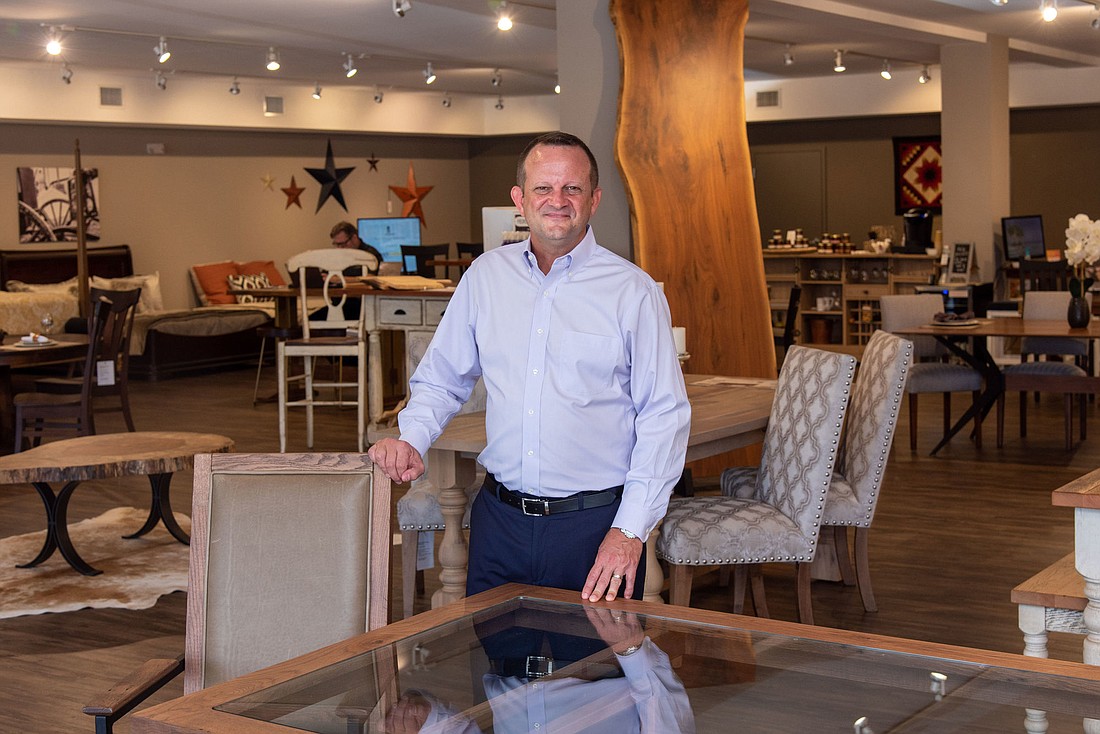- April 16, 2025
-
-
Loading

Loading

Gratitude. Lucky. Blessed.
That’s how Jim Miller, DutchCrafters CEO and founder, feels after the company not only survived the pandemic, but also grew substantially during it. DutchCrafters is a retailer of Amish furniture and home décor in Sarasota, as well as the daughter company of JMX Brands.
During the pandemic, the company added about 20 employees, pushing its payroll at least 50% to 61 employees through the first quarter. “It was quite a growth spurt for us," Miller says. “We’re an 18-year-old company, but we’ve never experienced anything quite so dramatic.”
Like many other CEOs in a variety of fields, Miller was scared for the future of the business when the pandemic hit. Turns out his fears were unfounded. “By the second or third quarter (in 2020) we were struggling to keep up,” with demand he says. It shows in revenue gains: in the 12 month period from April 2020 through this past April, revenue was up 92%, from $11.6 million to $22.3 million.
The company, to foster more growth, recently announced it's partnering with Ponton Interiors to redesign its showroom experience with an updated layout; representation of different woods, finishes and upholsteries; visual elements and displays; and a dedicated design center. The project is expected to be completed by fall 2021.
At the onset of the pandemic, Miller quickly sent 90% of his employees to work from home. “There was a lot of uncertainty,” he says. “I pledged to the staff to lead us through what appeared to be a storm and come out whole on the other side.”
He had three priorities for navigating the storm:
Keep employees and clients safe;
Avoid layoffs;
Work hard at improving profitability;
Sending employees home to work and closing the in-person store to clients helped Miller ensure the first priority was met. Miller was only truly worried about the second priority of avoiding layoffs for the first quarter.
As for the third priority, Miller explains the team had already maintained strong profitability levels. His true goal was to stay away from reverting back to net losses — and sacrifice all they worked for.
With these priorities in mind, Miller saw revenues start to pick up about midway through the second quarter of 2020 “I held off on hiring,” Miller says. “I wanted a sense of security.”
But by June, he couldn’t hold off any longer. “We had to hire because we were drowning in new client revenue,” he says.
This revenue growth came from what Miller calls a two-factor accelerator.
In 2018, the company faced a weakness in its SEO traffic due to a Google algorithm change. Since then, the team has worked hard on those deficiencies, a process that began a bit before the pandemic started. Around the same time, the company saw a surge in organic traffic. “This took us from zero to 60 in a matter of months,” he says.
As for the second factor, more people were working from home during the pandemic. With that comes the need for new home office furniture. Then stimulus checks hit and suddenly customers sought to purchase new furniture for different areas of their homes.
The in-person store was closed for a total of six months, reopening in October 2020.
DutchCrafters posted more sales in the first quarter of the store reopening than in any other year. The consumer demand has continued to remain strong, Miller says, adding he doesn’t believe the store will continue at that level.
Even with the surge, Miller will tell you 2020 was the best and worst year for the company — not everything has been rosy. He cites supply chain disruption as just one of the challenges his business endured.
With vendors trying to play catch up to meet demand, lead times are unusually long. “That’s had a direct impact on the customer experience so we get more frustrated customers,” he says. “We are at the mercy of the supply chain issues.”
Prior to the pandemic, DutchCrafters began using Amazon as a sales platform. The platform accounted for 10% of the company’s sales, but since Amazon is also dealing with the supply chain disruption, Miller was forced to shutter this part of the company. “It’s the only part (of the company) that has suffered,” he says.
While it’s not a complaint, adding 20 employees also quickly presented some tricky challenges.
“We’ve worked hard to develop a strong culture of employee engagement,” he says. But with the pandemic, all the first days and training was virtual. The company’s traditions, ceremonies and happy hours went virtual, too.
One of these traditions includes handing new employees the DutchCrafters polo shirt, which signifies the company's inclusion and representation. At the same time, the pandemic opened Miller up to a trend many other executives thought they'd never see: working from home. Eventually, Miller plans to offer a hybrid schedule for employees to work both remotely and in-person.
“It has a slow, erosive impact on the culture,” Miller says, on losing all the traditions. “We have some rebuilding to do.”